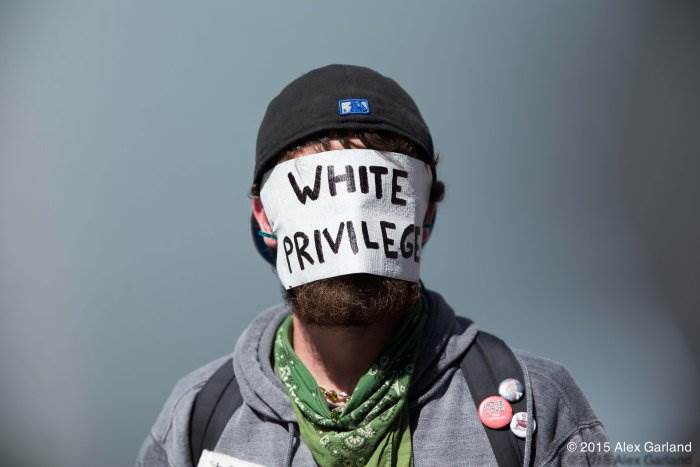By Caroline Randall (March 30, 2017)
In the fear and loathing that followed Trump’s election, my frustration and contempt for my fellow progressive white Americans has transcended a level I ever thought possible. I can’t physically stomach their attempts to be consoling, blaming the victory of hate and violence on the uneducated and conservative voters. This false assertion conveniently absolves us, the progressive white population, for the state of our nation, and allows us to continue preening ourselves on a pedestal of privilege- actively engaging in and greatly benefiting from the modern colonization we philosophically oppose. While conservative populations openly advocate for the unconstitutional policies we are seeing pass, the state of our nation isn’t completely their fault; it can largely be attributed to us. Most progressive white Americans are unaware that we support through action the colonial paradigm, and are often indifferent to the behaviors we engage in that hold the weight of systemic oppression, hatred, and violence. We are beneficiaries of over 400 years of white supremacy, whether we understand it or not. If we are going to actually penetrate this supremacy, those of us that benefit from privilege or occupy positions of institutional and systemic power have a moral obligation to publically and actively dismantle our oppressive foundations.
Upon examination of the power structures in every single institution in the United States, be it the criminal justice system, congress, public education, religious institutions, media, or business, we see that the membership of these institutions are at minimum 80% white. Since Eugenics is no longer a viable theory, it is clear that racism is supported systemically and runs our nation. Many of us progressive white American’s have the self-righteous and misguided view that we are the “good” ones, the ones that aren’t racist, and that aren’t a part of the problem. While in general, as a group, we don’t harbor active and overt racist, classist, or homophobic ideologies, we do as a group lack an active or authentic engagement with systemic oppression, making us complicit. To remain neutral, or choose to not actively fight an oppressive force is to side with the oppressor. Having anti-racist ideals without acting on them is supportive of systemic racism. This letter is a call to action inviting the progressive white to mobilize as a group and use our privilege to bring meaningful and systemic change.
When a white person looks at me and says, “don’t worry, we will get through Trump’s America” I want to scream. This statement demonstrates absolute ignorance in regards to power and privilege, and the institutionalization of racism in our nation. Marginalized populations face systemic barriers that are very real despite their “invisibility” to those that benefit from dominant culture privileges. To ignore these structural inequities is to support them and to encourage their thriving. Of course we will make it. We are white. This world was created for us to thrive. How can we look at our friends of color, and into their children’s eyes, knowing the oppression they have and will face will increase; knowing that the threat of violence both literally and metaphorically will increase? How can we look into a young girls eyes, knowing that she is growing up in a nation that positively reinforces racist violence and rape culture? How can we live with ourselves being secure in this reality knowing that her psyche is going to be shaped in ways that can and will permanently damage her? It’s superfluous that I am going to make it through safe, and I refuse to be complicit in a force that darkens her reality.
While this letter is asking white allies to step up, it by no means supports the idea that marginalized populations need white people to fight for them. Every marginalized population has incredible strength, resilience and power, and by no means needs a savior, white or otherwise. Successful resistance movements are largely absent in our nations popular history because white supremacist culture benefits from a socially accepted view that these groups are weaker. Whether it is stories of successful slave revolts, or the fact that WIC was created by the Black Panther party to support families of color, the omissions are oppressive.Every thread that weaves our dominant culture ignores and silences a lifetime of history that points to the purposeful and well executed oppression of marginalized peoples. To point out in any room that we are standing on stolen ground, benefiting from stolen labor generally shocks people, as the genocide of North American indigenous populations has been overshadowed by stories of heroic Europeans that brought democracy and freedom to the new world. If I bring up the history of bank loans or redlining, and the racist intentions that excluded American’s of color in the flight from crime infested cities and the construction of white utopias known as the suburbs people think I am paranoid or radical. We cannot separate our current reality from our history, and it is our duty to reeducate ourselves, so we can more effectively combat modern colonization alongside our brothers and sisters that have spent 400 years actively engaged in the fight.
It is vital that we relearn our history because supporting change without urgency has historically resulted in a lack of change. It is easy for somebody who knows their body is safe from harm, whose job is safe from harm, and whose ability to navigate the imperial state we live in safely to say, “Change takes time.” The great Reverend Dr. King lived this struggle every day of his life, and in all of his sagacity he writes, “wait has almost always meant never.” in his “Letter from Birmingham Jail” he said,
“We know through painful experience that freedom is never voluntarily given by the oppressor; it must be demanded by the oppressed. Frankly I have never yet engaged in a direct action movement that was ‘well timed.’…For years now I have heard the word ‘Wait!’ It rings in the ear of every Negro with a piercing familiarity. This ‘wait’ has almost always meant “never” We must come to see with the distinguished jurist of yesterday that “justice too long delayed is justice denied”
To ask people to wait for justice, is to deny justice. White progressives must fight for justice with an urgency reflecting this understanding. If we truly care about justice and our brothers and sisters we will refuse to wait any longer.
To truly be an ally, and a warrior of social justice, we have to resist the stigma that comes with being labeled radical, and ask ourselves hard questions about the choices we make. If we are truly anti-racist, and against segregation, we must be ready to ask how our own life choices relate to historical structures. Many of my fellow progressive white Americans oppose segregation philosophically, but systematically choose to segregate themselves and live in predominantly white neighborhoods and send their kids to predominantly white schools, because they understand this is a “better” environment and education. This is also choosing to segregate and accept less opportunity for children of color and otherwise marginalized children. We cannot leave our anti-racist ideals in the office. We must bring them home, and live in authentic accordance of our values. Our current racist structures hold the weight of history, and all the trauma that comes in the untold history. The ubiquity and force of this oppression is suffocating. It is the duty of all allies to utilize our privilege to leverage progress. We have a responsibility to actively engage in the dismantling of our racist social structures. The conservative white population that directly and openly support this racism is not going to enact any change in the system. The vast amount of systemic power and privilege we hold as a group is enormous, and we need to be agitated by the injustices our brothers and sisters’ face daily. We have a moral obligation to use our power and privilege to take on white supremacy as our highest and most urgent priority.
In the modern world, Media is the largest influence on the general population, and who controls the media, controls America’s consciousness. The current media paradigm is highly conservative, even when it is seen as moderate. Every time there is a story about a “marginal” or “radical” group like the Black Lives Matter movement covered on mainstream media, it is subject to discrediting attacks from conservative rhetoric. There are often very well-articulated arguments put forward by journalists of color, or otherwise marginalized voices, but we do not see nearly enough dominant culture allies stand up and say these attacks are wrong. White intellectuals with platforms of power have a responsibility to more visibly and openly dismantle these attacks and act in solidarity with any human rights movement. We need to change the narrative that demanding human rights is radical. The current narrative renders white supremacy as “a natural order” when it in fact is the radical paradigm. Equality is not radical. I do not give liberal white people a pass for not participating in change as they would if our own lives and comfort were at stake. I have watched liberal white Americans too often remain silent and allow white supremacy to prevail despite their intellectual understanding that it is wrong. If you are white, you benefit from white supremacy every day. If you do not fight this supremacy, you are part of it, progressive or not.
To make the jump from philosophically believing in justice to actively seeking it is an uncomfortable transition, but it is in this discomfort we have a choice. We can choose to seek comfort and find refuge in our fragility, (perpetuating racism) or we can choose to engage meaningfully with this discomfort, and examine what this fragility means. Resisting fragility and growing into an ally will teach us to use our privilege meaningfully rather than harmfully. To choose to engage despite our discomfort we are putting ourselves in danger as there are consequences to naming power. However, it is also important to see nobody has an inherent right to the safety created and sustained on the oppression of another group. Naming the power that permeates our every breath triggers the majority of any institution we are a part of to silence us by any means necessary, and as quickly as possible. Naming power puts at risk of losing our jobs, opportunities for future jobs, and we can even face physical dangers such as rape and murder- more extreme versions of silencing tactics. However, we have to remind ourselves that the safety allotted to us due to our whiteness is unearned, and we don’t have a right to it. It is more important to do what is right than what is safe. Why do my children get to keep their mother more than another child? If I lose my job, my skin allows me to find a replacement job at a higher rate than that of my friends of color. My psyche developed within the ideals of white racial superiority, and I grew up seeing myself reflected positively in the power structures of our world. Web DuBois, “how does it feel to be the problem?”- white liberals can go home and forget about this. Our right to comfort is directly tied to the socialized collective and unconscious idea that white people are racially superior. I cannot separate my emotional and economic stability from the history and legacy of colonization.
Our nation needs to change the narrative that being an ally is radical. When this happens modern colonization will be exposed as the actually radical existence and not a natural phenomenon. If we are authentically committed to racial equity, we won’t censure our voices or actions no matter how precarious of a position it leaves us in professionally or personally. Hesitation for the sake of self-preservation evokes racial privilege, and holding onto the security many populations have never had. Let’s align our actions with our ideologies and make some of the healthiest and healing revolutions this earth has seen.












